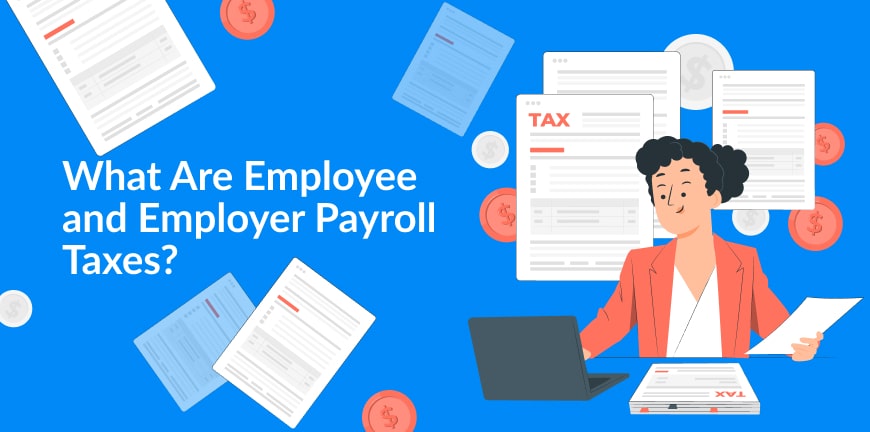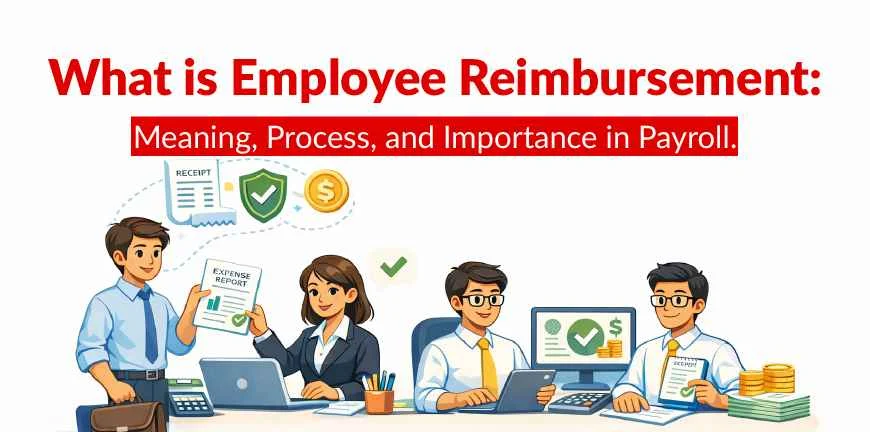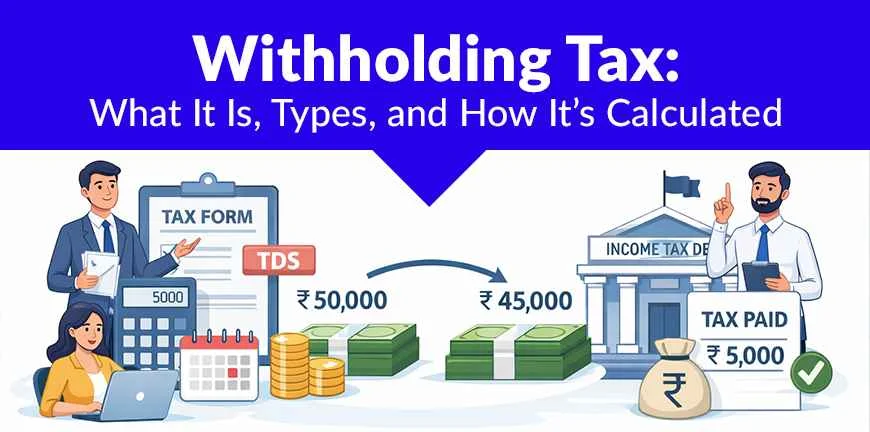
Understanding the Role of AI in Staffing – Benefits, Challenges, Best Practices
21/04/2025
What Is Payroll Tax Compliance? Benefits, Key Components, Best Practices
22/04/2025- What are Employee and Employer Payroll Taxes? Meaning & Definition
- How Do Payroll Taxes Work for Employees and Employers?
- What Payroll Taxes Are Employers Responsible For?
- What Is the Difference Between Employee and Employer Payroll Taxes?
- How Are Payroll Taxes Calculated and Withheld?
- What Are the Penalties for Failing to Pay Payroll Taxes?
- What Are the Best Practices for Managing Payroll Tax Responsibilities?
- Frequently Asked Questions (FAQs)
Payroll taxes play a significant role in funding public programs organised by government of India and states to ensure safety, transportation, health care, and other developmental activities are conducted without funding shortage. The responsibility of paying payroll taxes lies with both employers and employees and violations can lead to penalties and legal cases.
However, in-depth understanding of employer vs employee payroll taxes can provide valuable insights for both employees and employers to improve payroll management practices and achieve 100% compliance. Let’s go!
What are Employee and Employer Payroll Taxes? Meaning & Definition
When analysing employer vs employee payroll taxes, understanding the meaning and definition individually is crucial.
1. Employee payroll tax
Employee payroll tax meaning is simple and is the percentage of money deducted from an employee’s salary in the form of income tax and paid to the government to fund public programs. The amount of taxes collected for each employee varies based on salary package, tax slabs, PF and pension contributions, income tax laws applicable in the employer location, etc.
2. Employer payroll tax
Employer payroll taxes definition states that ” These are deductions incurred when companies hire people to run their business and in turn must pay a certain amount as salary from profits and investment. These deductions will be shown in employee payslips, but the payment must be made from the employer to the government.
How Do Payroll Taxes Work for Employees and Employers?
When we are looking at employer vs employee payroll taxes, the responsibilities weightage of each party must be gauged correctly to ensure compliance and legal requirements are met. Any violations from either party can result in non-compliance and legal hassles.
1. Employee payroll tax obligations
Employees working in India in a permanent role must file their payroll tax returns in accordance with the tax regulations and laws applicable in their state. By following taxation procedures promptly, employees can avail of tax benefits like Section 80C of the Income Tax Act. Additionally, employees must actively participate in the payroll tax compliance process by providing accurate tax details and investment information.
2. Employer payroll tax responsibilities
Compared to employee payroll tax deductions, employers have a lot more responsibilities when it comes to payroll tax management and compliance. The employer payroll tax responsibilities include:
- Employers must compute and deduct accurate TDS from employees and pay the same to the tax authorities on time.
- Employees must contribute their share of taxes for EPF and ESI schemes.
- Employers need to file regular TDS tax returns to the government so that they reflect correctly in the PAN details of the employees.
- Employees must maintain payroll records diligently and submit them to authorities whenever requested.
What Types of Payroll Taxes Do Employees Pay?
Employees must pay certain types of taxes to their respective tax authorities. Usually, the payroll management team at the employer’s end deducts the taxes from the employee salaries and pays them to tax authorities as a part of payroll compliance management. The different employee payroll tax deductions paid to tax authorities include:
- Income tax: Employees working in a permanent role at a company must pay a percentage of their income as tax to the government. The tax slab rate varies based on the annual salary package received. The current tax rates applicable in India are listed below.
| Income tax slabs (Rs) | Income tax rate (%) |
| Up to 4 lakhs | 0 |
| 4-8 lakhs | 5 |
| 8-12 lakhs | 10 |
| 12-16 lakhs | 15 |
| 16-20 lakhs | 20 |
| 20-24 lakhs | 25 |
| 24 lakhs and above | 30 |
- Professional tax (PT): Employee payroll tax deductions also include professional tax levied by the state government. It’s a nominal tax and varies from state to state with a maximum annual limit of Rs.2500.
What Payroll Taxes Are Employers Responsible For?
Employer payroll tax responsibilities are far more than employees and any violations can lead to penalties and legal consequences. As per the employer payroll tax guide, the different employer payroll taxes to be paid within deadlines to ensure compliance include:
1. TDS (Tax Deducted at Source)
Employers are obligated to deduct TDS from employees’ annual income that exceeds the threshold limit prescribed by Income tax authorities. If an employee earns more than 4 lakhs per annum, then the employer has to deduct TDS as per the old and new tax regimes and pay it to the tax authorities within deadlines to avoid legal trouble.
2. Employees’ Provident Fund (EPF)
It is a retirement savings scheme where both employees and employers have to contribute 12% of employee’s basic salary package plus dearness allowance.
3. Employees’ Pension Scheme (EPS)
It is a scheme where employees will receive a fixed amount after their retirement. Out of 12% EPF contribution, 8.37% is considered as EPS amount.
4. Gratuity
As per Indian labour laws, employers must pay gratuity to employees who have served 5 years or more. Usually, the gratuity amount is equal to 15 days’ salary received for each year of service.
5. ESI (Employees’ State Insurance)
The employees are eligible for health insurance under ESI Act,1948. Under Rs 21000 gross salary ESI is applicable and employer must pay the premiums under employee’s payroll account.
What Is the Difference Between Employee and Employer Payroll Taxes?
The key differences between employer and employee payroll taxes include:
| Aspect | Employee Payroll Taxes | Employer payroll taxes |
| Definition | These are the taxes paid by the employee to the tax authorities as a percentage of annual salary based on tax slab rates | These are the taxes paid by the employer to the tax authorities based on the employee’s annual income to avoid penalties and achieve compliance |
| Responsibility | Employees must bear the cost, but employers pay them to authorities on their behalf | Employer must bear the cost and pays them to authorities from employees’ salary |
| Components | TDS and professional tax | EPF, ESI, TDS, Gratuity, and EPS. |
| Impact on Salary | Reduces take home salaries of employees | It comes under CTC package offered. |
| Regulatory Filing | Employees must file Form 16 as a part of income tax returns filing. | Employers file separate statutory returns for ESI, EPF, and other labour compliance reports. |
How Are Payroll Taxes Calculated and Withheld?
To calculate employee and employer payroll taxes and withholdings, we first compute the employee’s gross pay. The next step is to calculate the tax withholdings for TDS, ESI, EPF, EPS, professional tax, health and education cess.
These taxes are calculated as percentages of employees’ gross pay. When a company offers employment, an annual CTC (cost-to-company) is a combination of gross pay and employee payroll tax deductions that will be mentioned in the offer letter.
The employer is obligated to pay the taxes involved in these deductions to the government to achieve compliance and prevent penalties and legal cases.
What Are the Penalties for Failing to Pay Payroll Taxes?
Failing to pay employee and employer payroll taxes or engaging in tax evasion activities can lead to serious financial consequences. The punishment for failing to pay payroll taxes varies based on the type and seriousness of the tax evasion or avoidance. Here are a few tax evasion and avoidance scenarios:
- Failing to file income tax returns within the deadline.
- Furnishing incorrect or hiding PAN card details.
- Inaccurate information in income tax returns.
- Non-compliance with payroll tax regulations
- Failure to respond to tax notices.
- Non-payment of taxes.
- Failure to submit audit reports.
- Misreporting or concealing of income.
Such non-compliance with payroll taxes can lead to the following consequences.
- Hefty penalties for late filing and tax evasion.
- Show cause notices from the IT department.
- Lawsuits from tax authorities and imprisonment.
- Business license cancellation.
- Asset seizure.
- Travel bans and damage to brand reputation.
What Are the Best Practices for Managing Payroll Tax Responsibilities?
Managing employer payroll tax responsibilities can be challenging as navigating through complex Indian tax laws and regulations and staying up to date with the latest amendments requires specific skills and expertise.
However, with the right strategies and due diligence efforts, payroll tax compliance can be achieved, and legal troubles can be evaded with relative ease. Here are the 7 best practices for effective management of employer payroll tax responsibilities:
- Stay up to date with the latest payroll tax regulations to align your payroll management process accordingly.
- Leverage technology such as AI and payroll management software to streamline payroll and reduce errors.
- Conducting regular audits either internally or externally with the help of a top payroll audit agency like ALP Consulting to identify and mitigate payroll errors.
- Securing employee payroll data through stringent cybersecurity measures can help prevent data breaches and achieve compliance.
- Maintaining accurate payroll records is essential for validation and for preparing final audit reports to demonstrate compliance.
- Foster transparency in payroll management to build trust among employees and stakeholders.
- Streamline the payroll tax management process continuously to reduce errors and improve outcomes.
Frequently Asked Questions (FAQs)
1. What are employee payroll taxes?
Employee payroll tax deductions are the percentage of annual salary that must be paid to income tax authorities such as TDS, professional tax, etc.
2. What are employer payroll taxes?
Employer payroll taxes are the percentage of the annual salary of employees that must be paid by employers towards tax authorities such as TDS, EPF, ESI, Gratuity, etc.
3. How are payroll taxes different for employees and employers?
The key differences between employer and employee payroll taxes are employers have more responsibilities than employees to ensure compliance, the filing of tax returns is different for both employers and employees, the type of payroll taxes to be paid varies according to tax laws, etc.
4. Are payroll taxes the same as income taxes?
Both employees and employers must pay payroll taxes to ensure compliance and prevent legal troubles whereas income tax payment is the sole responsibility of employees.
5. Are payroll taxes the same in every state?
Payroll taxes vary from state to state based on employees’ income, tax slab rates, the state’s professional tax regime, etc.
6. What is the difference between FICA and payroll taxes?
Federal Insurance Contributions Act (FICA) is payroll tax deducted in the USA by their government whereas payroll taxes are deductions done by employers in India and paid to income tax authorities.
Contact Us For Business Enquiry

Yugandhara V. M
Yugandhara V. M serves as the Assistant Vice President – HRO at Alp Consulting Ltd., bringing over 14 years of rich experience in Human Resource Outsourcing, payroll management, and statutory compliance. He specializes in driving process excellence across HR operations, ensuring seamless service delivery and compliance with labor laws. Yugandhara’s expertise lies in managing large-scale client engagements, optimizing HR processes, and implementing efficient workforce management systems that enhance organizational performance. He also leads comprehensive payroll services, ensuring accuracy, timeliness, and compliance for diverse client portfolios.




